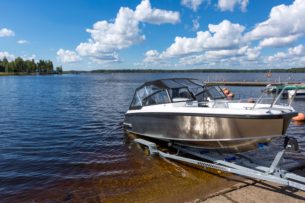In this section, you’ll find all of the information you need regarding the documentation you must have when buying a boat and becoming a boat owner.
- What documentation do I need to own a boat?
- What is boat title documentation?
- What surveys do I need when buying a boat?
- Do I need a boat registration certificate?
- What is RCD compliance?
- Do I need a document to prove VAT status?
What documentation do I need to own a boat?
The core documentation you should have once you’ve purchased a boat include:
- The original copy of the builder’s certificate (from the manufacturer) including the boat’s details, ID numbers and who the title has passed to.
- The original bill of sale, which will transfer the title in the boat to you.
- The original VAT invoice addressed to you, confirming all of the details of the boat including the hull ID number, ex-VAT price, VAT amount and total price including VAT.
With used boats some of the above documents may be missing and this represents a risk to you. For each sale of a boat, there should be a bill of sale between the vendor and the purchaser making up a continuous chain of ownership.
Note: When using Promarine Finance we will store the originals of these documents whilst the mortgage is outstanding and we will provide you with stamped copies.
Chris Manners, from TBS Boats, discusses the admin involved in boating. Find out:
- whether you need a license for river cruising
- what boat insurance you will need
- the documentation to provide a boat buyer
What is Boat Title Documentation?
You may find that older boats may not have the boat title documentation in full, however, at the very least you should be presented with a bill of sale showing how the current owner purchased the boat.
If your boat is new, you’ll be able to request the title documentation for the boat in full, which includes the bill of sale, the documentation that transfer legal title in a boat. When viewing these you should be able to access a comprehensive paper trail, tracing back to the original builder’s certificate.
Note: It is important to have ownership of the original copies of these documents.
The builder’s certificate confirms the details of the first owner (name and address) as well as the selling dealer, hull ID number, the year the boat was built and yard number. This certificate also provides you with information about the type of engine fitted, dimensions and tonnage of the vessel.
What surveys do I need when buying a boat?
When buying a boat, the most common survey needed, whether a boat is new or used, is the pre-purchase survey.
This is often called a full condition survey which provides a detailed report examining the condition of all accessible areas of the vessel and the equipment. The survey should be able to provide you with the status of the condition of the vessel as well as the durability of the hull and structure. Include this documentation in your pack, keeping all of your boat information together.
It is worth noting that a valuation survey may be required if you are seeking a finance agreement and it’s also recommended that you research the cost associated with getting a qualified surveyor to undertake the checks beforehand as you will need to know what is required as part of your boat insurance terms – saving you from drumming up extra costs for additional checks.
Additional specialised engine reports are useful for motor boats because the engines represent a significant part of the overall value of the boat.
Chris Manners, from TBS Boats, discusses the paperwork involved in boating. Find out:
- whether you need a license for river cruising
- what boat insurance you will need
- the documentation to provide a boat buyer
Do I need a boat registration certificate?
To use your boat on inland waterways such as canals and rivers, you will need to register your boat. You can do this by contacting the navigation authority of the waterway you want to use. Most common is the Environment Agency or Canal and River Trust but there are other bodies to contact depending on where you wish to use your boat.
Note, before you can buy a licence to use inland waterways, you may need to get a Boat Safety Scheme (BSS) certificate (unless a new boat). If your boat does require a BSS certificate you’ll need to have your boat tested every 4 years and failure to do so or failure in having a certificate could result in a penalty.
For ocean going vessels registration of leisure craft in the UK is not compulsory, Boats that are registered in the UK can be registered on the Small Ships Register (SSR) – however, it doesn’t reveal or prove ownership information.
When using a boat abroad it is often a requirement of the country visited that you Part 1 register your boat with the MCA.
Most lenders and sometimes ourselves require boat to be Part 1 registered which will show a lenders interest and owners details.
What is RCD Compliance?
RCD stands for the Recreational Craft Directive, now called RCR – Regulatory Craft Regulations, no changes just a different name post-Brexit.
It consists of the regulations that apply to all recreational craft between 2.5 and 24 metres in hull length, regardless of the means of propulsion. Since 1996 anyone putting a boat into service has a legal obligation to ensure the craft meets requirements and has appropriate CE marking.
British Marine provide a full guide on RCD Compliance documentation as well as RCD awareness courses for its members
Do I need a document to prove VAT status?
Privately owned boats used by EU residents within the EU are required to be VAT paid.
You may be asked to provide evidence that VAT has been paid, so the VAT status documentation is important to have in your paperwork as part of your boat ownership.
Richard Bates, from Bates Wharf Marine Sales, discusses the paperwork you need when buying a boat. Find out:
- the courses recommended for boat owners
- the certificates you need
- about VAT certificates
- the services provided by a surveyor
Continue Reading

Things to look for when buying a boat and tips on price negotiation
Here you’ll find all of the information and some top tips when setting up a viewing and taking your potential new boat purchase for a test drive Arranging a viewingWhat…

Boat Buyer’s Guide Video Library
Welcome to the boat buyer’s guide video library. Below you can choose the category you’d like to skip to, each including some brilliant insights from a range of leaders in…

